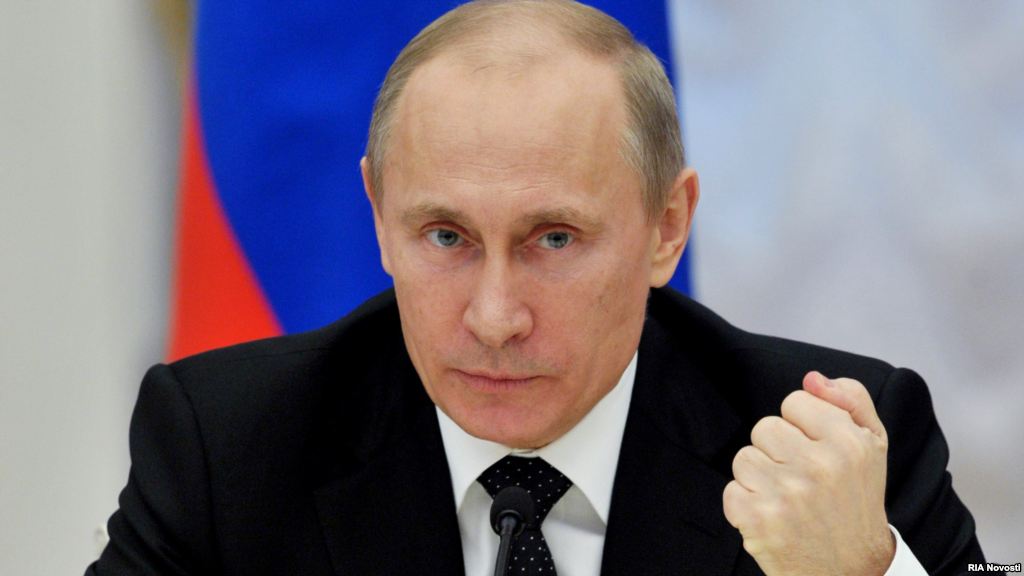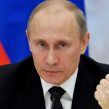
Aggressive Nationalism and Anti-Americanism Are the Kremlin’s New Ideological Pillars
Publication: Eurasia Daily Monitor Volume: 10 Issue: 28
By:

This week, speaking at a meeting of Russia’s top security officials—the so called “extended collegium” of the Federal Security Service or FSB—Alexander Bortnikov, the FSB chief, announced: “Geopolitical pressure on Russia, coming from the United States and its allies who still consider our nation one of their main rivals on the world arena, increased in 2012,” while the FSB worked to boost Russia’s standing in the world. The FSB (Federalnaya Sluzba Bezopasnosti) is the main successor organization of the Soviet KGB, and its powers have been drastically increased after Vladimir Putin came to power in 2000 (Interfax, February 14).
President Putin presented a keynote speech at the FSB “extended collegium,” denouncing as “unacceptable” any pressure on Russia and its allies, or “any direct or indirect meddling in our internal affairs.” Putin stressed that “no one receiving foreign money may speak on behalf of Russian society” and called on the FSB to strictly implement recently approved legislation “regulating the activities of nongovernmental organizations [NGOs] receiving foreign funding.” Putin called on the FSB to restrain from internal corruption and of involvement in “commercial disputes,” as well as not to hinder “investment projects.” Putin also demanded the FSB to speedily create a “joint national cyber warfare system.” The president asserted Russia’s right to “reintegrate the post-Soviet space” and rejected “foreign [Western] pressure to slow down the integration.” Putin demanded that the FSB defend the process of post-Soviet integration from hostile foreign pressure “in close cooperation with colleagues [secret services] from Belarus, Kazakhstan and other nations taking part in the integration process.” Putin announced that last month, FSB officers got a 40-percent pay increase, that 11,000 free apartments were handed out to loyal agents in 2012 and more bonuses will be in the offing (RIA Novosti, February 14). Last year nongovernmental organizations receiving foreign funding were ordered to register as “foreign agents,” and as of January 1, 2013, nongovernmental organizations that receive any support from the United States or employ any US citizens are outlawed and their assets must be confiscated (RIA Novosti, December 28, 2012).
On the same day Putin addressed the FSB “extended collegium,” First Deputy Defense Minister and Chief of General Staff, Colonel-General Valery Gerasimov, speaking at a different conference in Moscow, announced: “Russia is effectively rearming to repel the threat of foreign invasion.” According to Gerasimov, the proportion of “modern armaments” has increased from 6 to 16 percent, from 2008 to 2013, as a result of military reform. By 2015, “new weapons” will make up 30 percent of total arms, and by 2020—70 percent. Deputy Defense Minister Colonel¬-General Oleg Ostapenko has been tasked with creating a system of departments and institutions “to develop military science and promote innovative technologies.” According to Gerasimov, speedy rearmament is essential, since by 2030 “foreign military threats to Russia will increase significantly.” The Russian military command assumes, according to Gerasimov, that leading world powers may go to war to gain access to oil, gas, other natural resources, to control consumer markets and gain “living space” or Lebensraum—an important component of Nazi ideology in Germany that still seems to be an important argument in defense planning in Moscow (RIA Novosti, February 14). The General Staff (the traditional center of national strategic defense planning in Russia) apparently believes that the abundance of oil, gas, other natural resources and an extended landmass, though mostly not particularly hospitable, make Russia extremely vulnerable to the envy of the world, which by 2030 may gravitate swarms of invading foreign armies from all directions.
Last week, Putin unexpectedly attended and delivered a keynote speech at an inaugural congress of a self-styled “patriotic” organization, the “All-Russian parents’ resistance.” The chairman of the congress—firebrand revisionist demagogue Sergei Kurginyan (63)—before welcoming Putin’s address, spoke for almost an hour, denouncing the pro-democracy protest movement in Moscow and other covert US agents, the likes of which, according to him, destroyed the Soviet Union in 1991 and now are conspiring to destroy Russia. Both Putin and Kurginyan strongly supported banning Americans from adopting Russian children—a policy that became law last December (Kommersant, February 11). Putin’s appearance at the congress, seemingly hurriedly convened in downtown Moscow with logistical and organizational help from the Kremlin, clearly signals that extreme nationalistic and revisionist demagogues, who once strongly criticized Putin for being too economically liberal and pro-Western, are now considered close allies as the present regime is overtaken by a siege mentality is solidifying aggressive nationalism, post-Soviet “reintegration” and anti-Americanism as its ideological pillars. The notion that the Barack Obama administration is plotting regime change in the Kremlin or actually sees present day Russia as a serious foreign policy or ideological priority may sound awkward in Washington, but not so in Moscow.
This week, Putin introduced legislation that will forbid government officials, parliamentarians, judges, top executives and board members of state-controlled corporations, banks and foundations and their close kin from having accounts in foreign banks or own any foreign stocks or other equity, including foreign Treasuries. All foreign real estate must be declared and the origins of its purchase disclosed. Only Russian diplomats and members of their families posted abroad will be exempt. Offenders that continue to keep foreign equity, bank accounts and real estate will be cleansed from their positions by the Russian security services. Newly appointed officials will have three months to ditch any foreign possessions. Putin demands absolute loyalty from his henchmen, since the draft legislation cites any foreign possessions as a “national security risk” (Kommersant, February 13).
A leading deputy from the ruling United Russia party, chairman of the Duma ethics committee Vladimir Pekhtin, was accused by the anti-corruption campaigner and pro-democracy protest leader Alexei Navalny of owning real estate in Florida. Pekhtin denied the accusation, demanded an official investigation but, surprisingly, provisionally resigned his committee chairmanship before his name is cleared (Interfax, February 14). Senator and chairman of the Federation Council Foreign Relations Committee Mikhail Margelov was also accused of having real estate in Florida. He has denied this and has not yet resigned from his commission (ITAR-TASS, February 14). Succumbing to a siege mentality, Putin wants to “nationalize” his ruling elite to eliminate foreign (US) influences that may be used in a presumed regime-changing conspiracy. This is creating problems and panic, since corrupt Russian officials have been for decades taking money out of Russia to foreign havens.




